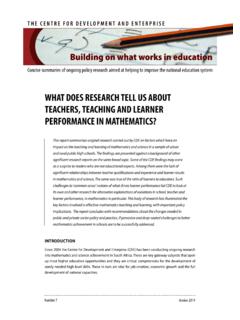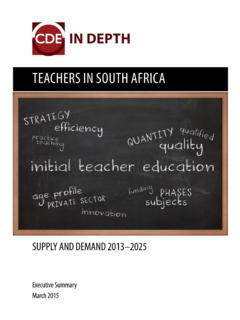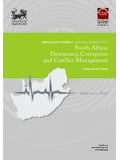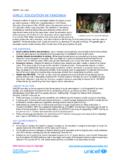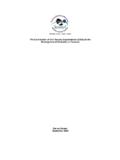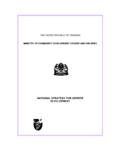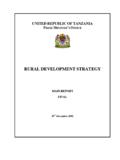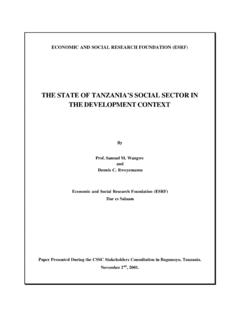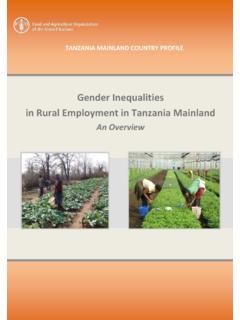Transcription of THE REAL COST OF COMPLIANCE The Impact of …
1 THE real cost OF COMPLIANCE . The Impact of South african regulatory requirements on independent Schools The private education sector has grown virtually across the board in developed and developing countries. Internationally, governments are making greater use of private participation in education to assist in meeting their education policy objectives. As part of an overall reform strategy for South Africa's ailing education system, the Centre for Development and Enterprise (CDE) has become increasingly interested in the potential of low-fee independent schools to provide quality education to disadvantaged learners. This research explores the cost facing these schools of complying with regulatory requirements . January 2016. The Centre for Development and Enterprise, South Africa's leading development think tank, focuses on vital national development issues and their relationship to economic growth and democratic consolidation.
2 Through examining South african realities and international experience, CDE formulates practical policy proposals for addressing major social and economic challenges. It has a special interest in the role of business and markets in development. Series editor: Ann Bernstein This report is based on research papers written by Peter Habberton and Debra Shepherd. The report was written by Dr Kim Draper (CDE's Programme Manager: education /Skills) and Dr Jane Hofmeyr (formerly CDE's education Policy and Advocacy Director). The research was funded by Pearson. The funders do not necessarily agree with the views expressed in the report. Published in January 2016 by The Centre for Development and Enterprise 5 Eton Road, Parktown, Johannesburg 2193, South Africa P O Box 1936, Johannesburg 2000, South Africa Tel +27 11 482 5140 Fax +27 11 482 5089 The Centre for Development and Enterprise All rights reserved.
3 This publication may not be reproduced, stored, or transmitted without the express permission of the publisher. It may be quoted, and short extracts used, provided the source is fully acknowledged. ISBN: 978-1-920653-20-0 Contents Introduction 1. Why Regulate? 2. The International Experience of School Regulation 2. Research Design 4. regulatory requirements for Public Schools in South Africa 7. regulatory requirements for independent Schools in South Africa 8. Rand cost in Terms of Skill Level and Time 22. Benchmarking CDE's Findings 26. Summary of the Quantitative Findings 27. Key Issues 27. Recommendations 28. Concluding Remarks 30. Endnotes 31. Appendix 1: Laws and Regulations Applicable to independent Schools 35. Appendix 2: The requirements for Provincial Registration of an independent School in Gauteng 36. The i mp a c t o f S o ut h Afr ic an regulato r y re qui re m e nts o n i n de pe n de nt s c h o o l s Acronyms ACSI Association of Christian Schools International ANA Annual National Assessment BRAC Bangladesh Rural Advancement Committee CASPA Catholic Schools Proprietors' Association CDE Centre for Development and Enterprise CIPC Companies and Intellectual Properties Commission COIDA Compensation for Occupational Injuries and Diseases Act DBE Department of Basic education EE Employment Equity EEA Employment Equity Act EMIS education Management Information Systems GDE Gauteng Department of education GENFETQA General and Further education and Training Quality Assurance Act IQAA independent Quality Assurance Agency IQMS Integrated Quality Management System ISC independent Schools Council ISA independent School Association ISASA independent Schools
4 Association of Southern Africa LSEN Learners with Special Educational Needs MEC Member of the Executive Council NAISA National Alliance of independent School Associations NAPTOSA National Professional Teachers' Organisation of South Africa NNSSF National Norms and Standards for School Funding NOD Non-profit Organizations Directorate NPC Non-Profit Company NPO Non-Profit Organisation NSC National Senior Certificate OHSA Occupational Health and Safety Act PAEPL Provincial Average Estimate of Expenditure Per Learner PAYE Pay As You Earn PBO Public Benefit Organisation PED Provincial education Department PPP Public-Private Partnerships The i mp a c t o f S o ut h Afr ic an regulato r y re qui re m e nts o n i n de pe n de nt s c h o o l s SACE South african Council for Educators SAQA South african Qualifications Authority SARS South african Revenue Service SASA South african Schools Act SDA Skills Development Act SDF Skills Development Fund SDL Skills Development Levies (Act).
5 SETA Sector education and Training Authority SIP School Improvement Plan SITE Standard Income Tax on Employees SMMEEs Small, Medium, Micro and Emerging Enterprises UIA Unemployment Insurance Act UICA Unemployment Insurance Contributions Act UIF Unemployment Insurance Fund UK United Kingdom VAT Value Added Tax WSE Whole-School Evaluation The i mp a c t o f S o ut h Afr ic an regulato r y re qui re m e nts o n i n de pe n de nt s c h o o l s Introduction The private education sector has grown virtually across the board in developed and developing countries. Internationally, governments are making greater use of private participation in education to assist in meeting their education policy objectives through private philanthropic initiatives and the private financing of infrastructure. A key trend has been the emergence of different forms of private involvement in education through public-private partnerships (PPPs).
6 1 One reason for this expansion is the inability of public school provision to keep pace with the growing demand for education . Other factors include the dissatisfaction with the quality of public education ( large class sizes, teacher absences, and lack of books and teaching supplies), and the demand for schools with a religious affiliation or alternative philosophy to what public schools are able to provide. In South Africa, the private, officially known as the independent , school sector is characterised by a diversity of not-for-profit and for-profit providers charging a very wide range of fees. Both registered and unregistered (illegal) schools exist. By international comparison, the independent school sector in South Africa is small2 and the low-fee segment of schools is especially so, although it is growing rapidly. As part of an overall reform strategy for South Africa's ailing education system, the Centre for Development and Enterprise (CDE) has become increasingly interested in the potential of affordable or low-fee independent schools to provide quality education to disadvantaged There are investors and donors that are keen on investing in or supporting the low-fee independent schools in South Africa, but one of the key risks that CDE identified in its 2015 report, Investing in Potential: The financial viability of low-fee private schools in South Africa, arises from the maze of legislation governing independent schools and the high cost of COMPLIANCE .
7 The South african Constitution of 19964 and the foundational legislation such as the South african Schools Act (SASA) of 1996, the Companies Act of 2008, the Income Tax Act of 1962, and the Municipal Property Rates Act of 2004 are supportive of independent schools. So too is the Department of Basic education (DBE).5 Registered, not-for-profit independent schools that serve disadvantaged communities are able to access a provincial education department (PED) However, the secondary legislation and ever-expanding regulations from all sectors of government are increasingly disabling. International experience shows that the nature of the regulatory environment strongly influences the expansion of the independent school sector. Unless it is enabling, the sector will not grow optimally, schools will not survive and thrive, and opportunities for public-private collaboration and partnerships to improve choice, access and quality of schooling for all children will not be optimised in serving the national interest.
8 A. high regulatory burden can also have perverse effects on the number of unregistered independent schools. Analysis of the Kenyan private schooling sector indicates that, owing to the complex set of procedures for registering a private school, many school owners are prompted to pre-emptively open their schools without Similar findings have been observed for There is growing concern in the independent school sector in South Africa about the extensive, time- Centre for Development and Enterprise 1. The i mp a c t o f S o ut h Afr ic an regulato r y re qui re m e nts o n i n de pe n de nt s c h o o l s consuming and costly tasks required of schools to be fully compliant with all regulations. Between 2010 and 2013, the policy unit of the independent Schools Association of Southern Africa (ISASA) identified 246 pieces of legislation that affected independent schools and in the first half of 2015, it analysed 36 new In order to better understand the Impact that the South african regulatory environment has on independent schools and especially low-fee ones, CDE undertook research to quantify the time taken, skill level involved, and direct monies paid on regulatory COMPLIANCE by a sample of independent schools.
9 This report presents the findings of its research. Why Regulate? It is natural that the public would be concerned with the educational environment in non-government schools. The children are citizens and their welfare is important. Hence all governments have rules and regulations pertaining to the establishment, operations and results of non-government schools. Mechanisms must be in place to ensure that teaching staff, facilities, equipment, and materials are sufficient and appropriate to enable quality teaching and learning and keep children safe and healthy. Regulation is one way that a government can ensure that provision by both public and private sectors are of high quality. To ensure quality, governments are fully entitled to check those wishing to open and operate private schools. Those private schools offering high quality education often welcome effective regulation and quality assurance mechanisms.
10 They protect the sector from poor quality, and fly-by-night organisations. Negative publicity about private providers that offer poor quality instruction can harm the reputation of the sector as a whole and affect its credibility. This is the case in South Africa, where the independent schools and their associations are supportive of necessary, fair and appropriate quality control and accountability and want to work with government as a complementary partner in providing quality education to all learners. A regulatory environment that supports the private sector and assures quality provision of education also ensures the long-term sustainability of the sector. The International Experience of School Regulation Government funding policies generally favour public provision over private provision, and in many countries, the regulatory framework does little to support growth in the private education It is clear that the governments in some countries make it more difficult for investors and owners of private education institutions to become established and operate than others.
